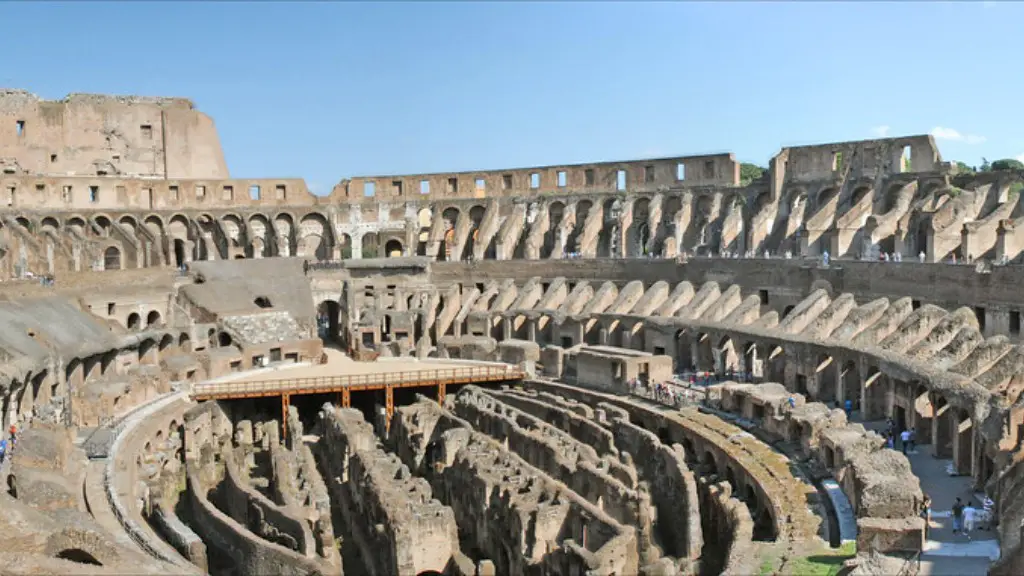Overview of the Roman Census
The Roman census was used to count the population of the Roman Empire, evaluate their resources and assign taxes. It was a detailed process that began with the survey of households, moved onto individuals and the enumeration of citizens and ended with the determination of any outstanding levies.
Purpose and History of the Roman Census
The main purpose of the Roman census was to levy taxes across the Roman Empire. Roman law stated that all men should contribute to the state and this tax system was the main way to ensure fairness.
The first recorded census occurred in 304BC and was conducted by Appius Claudius. This census was one of many over the years and was conducted with meticulous detail. It was the basis for subsequent censuses which took place every five years into the 1st century BC. The Roman Senate was then able to ascertain the number of citizens and non-citizens alike.
Information Collected During the Census
The census collected vast amounts of information about its citizens, starting with the households. During this stage, information about the marital status, number of children and property was gathered. This was then followed by the collecting of details like names, ages, professions and lineage.
In regards to the Roman Empire, the census was also used to define citizenship. This involved those citizens who had voting rights and those who did not. The census then determined which citizens to assign the various taxes to.
The Roman Census and Modern Day Politics
The Roman census ultimately shaped the future of Roman politics because it allowed leaders to see exactly who was in their population, and assess their resources. The Romans were well known for their political strategizing and organisation, so it is easy to see why they found the census to be so useful.
In modern day politics, the idea of a census continues to remain relevant. The US census, for example, is used to determine the seat distribution in Congress and the assignment of voting rights. This shows how the Roman’s use of the census still continues to have an effect in politics today.
Impact of the Roman Census on Social Life
The Roman census had a major impact on social life. It gave an indication to the number of citizens within the population and played a role in assigning voting rights to those who qualified. Those who did not pass the census requirements experienced a number of disadvantages such as being unable to run for office or receive certain benefits.
Furthermore, the census also contributed to a stratified society. Citizens were divided into different classes, some of which received greater voting rights and benefits than others. This created a rigid social structure which either helped or hindered certain citizens.
The Roman Census and the Economics of the Roman Empire
The Roman census directly affected the economics of the Roman Empire. This is because it provided leaders with the data they needed to assess resources, raise taxes and assign them to the right citizens, enabling the Empire to be self-sufficient on financing.
Additionally, the census also had an effect on the economy by influencing expenditure. This increased government expenditure and allowed the Empire to finance civil projects. These projects, such as water supply networks, infrastructure and sewerage systems, helped to stimulate the economy.
The Limitations of the Roman Census
The Roman census was far from perfect. It failed to capture all of the citizens who resided in the Empire and systematically excluded certain classes of people, such as slaves and those in conquered regions.
As the population of the Roman Empire grew, this further widened the gap between the citizens recorded in the census and the actual population. This made the census inaccurate and led to the downfall of the Roman government.
Assessment of the Roman Census
Overall, it is easy to see that the Roman census was a successful form of data gathering. This is because it enabled the empowerment of citizens through assigning voting rights and provided leaders with the data they needed to assess the resources of the Empire. Additionally, the census influenced Roman economics by helping to finance civil projects to stimulate the economy.
However, the census had its own limitations. It failed to capture all citizens and ignored certain classes of people, leading to inaccurate information. This ultimately contributed to the downfall of the Roman government.
Influence of the Roman Census
The influence of the Roman census can be seen in politics today. Even though the Roman Empire has long been gone, the concept of a census remains relevant in modern day countries. It is the basis for democracy and is used to determine the number of representatives within a government, and the assignment of voting rights.
The influence of the Roman census is also evident in the sociology of the present day. It contributed to the Roman stratified society and continues to have an impact of social life even centuries later.
Adaptations to the Roman Census
Since the fall of the Roman Empire, the idea of a census has been adapting to suit the needs of the people. When the US became its own nation, the first census was conducted in 1790 with the purpose of redistributing Congressional seats among the then 13 colonies.
The census we have today is much different from the one used in Ancient Rome. The US Census looks to find out the total number of individuals living in the US and its territories and information about ethnicity, language and income.
Technological Advancements of the Roman Census
The process of the Roman census was very labour intensive and required a lot of attention to detail. It was an important undertaking but it was limited by its manual nature.
Technological advancements in data collection have made it possible for countries to conduct their census with less manual labour. This has enabled countries to gather more accurate data with a lot less effort and allowed the census to be a more effective way of gathering information.
Conclusion of the Roman Census
The Roman census was an important part of the government and enabled a better understanding of the population. It shaped Roman politics and social life, allowing leaders to get an accurate assessment of the citizens, their resources and expenditure.
Today, the Roman census is still relevant in modern day societies. We have adapted and improved the census over time with technological advancements, but still holds some of the same values as the one conducted in Ancient Rome.



